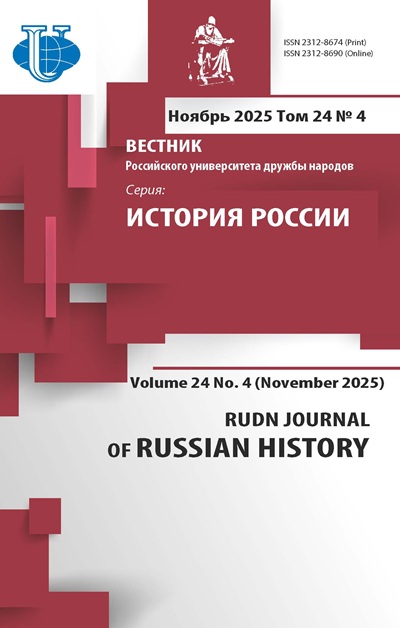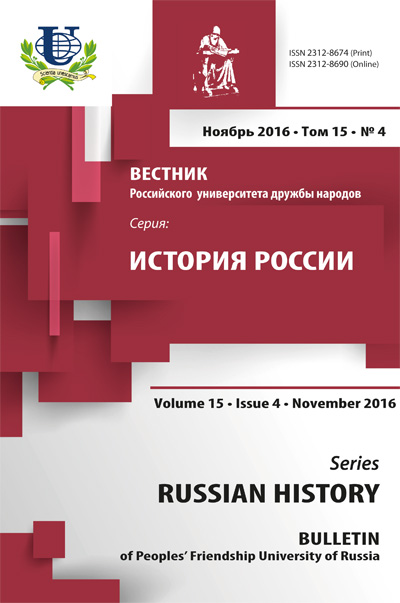ЯРМАРОЧНАЯ ТОРГОВЛЯ КАК МЕХАНИЗМ КУЛЬТУРНОЙ ИНТЕГРАЦИИ В ПОЛИЭТНИЧЕСКИХ РЕГИОНАХ: НА ПРИМЕРЕ ЯРМАРОК СРЕДНЕГО ПОВОЛЖЬЯ В XIX В.
- Авторы: Краснощеков В.А.1
-
Учреждения:
- ФГБОУ ВПО Поволжский государственный университет сервиса
- Выпуск: Том 15, № 4 (2016)
- Страницы: 46-56
- Раздел: СТАТЬИ
- URL: https://journals.rudn.ru/russian-history/article/view/15296
- ID: 15296
Цитировать
Полный текст
Аннотация
Настоящая работа представляет собой историко-культурологический анализ ярмарочной торговли на территории Среднего Поволжья в XIX в. с целью выявления роли ярмарок в процессах культурного взаимодействия в полиэтнических регионах. Проведенный анализ показал, что ярмарки как формы традиционной культуры исполняли роль одного из механизмов культурной интеграции народов Среднего Поволжья в рассматриваемый период. Опыт ярмарочной торговли является важным культурным наследием в регионе, так как порождает принципы консенсуса во взаимодействии различных культур.
Ключевые слова
Об авторах
Владимир Александрович Краснощеков
ФГБОУ ВПО Поволжский государственный университет сервиса
Email: kulbiaka@yandex.ru
ул. Гагарина, 4, 445677, п/о 54, до востребования, Тольятти, Россия
Список литературы
- Ижикова Н.В. Ярмарка в социально-экономическом и культурологическом аспектах: автореферат дис.. кандидата культурологии: 24.00.01. Москва, 1998. 19 c.
- Некрылова А.Ф. Русские народные городские праздники, увеселения и зрелища, конец XVIII - нач. XX в. Л.: Искусство, 1984. 191 с.
- Орлов О.Л. Российский праздник как историко-культурный феномен: автореферат дис.. доктора культурологии: 24.00.01. СПб., 2004. 31 с.
- Сухова О.А. Провинциальное предпринимательство: основные направления деятельности и культурная среда второй половины XIX - начала ХХ вв.: По материалам Сред. Поволжья: дисс.. канд. ист. наук: 07.00.02. Пенза, 1998. 263 с.
- Хвольсон Д.А. Известия о хазарах, буртасах, мадьярах, славянах и руссах Абу-Али-Ахмеда-бен Омара-Ибн-Даста, неизвестного доселе арабского писателя начала X века по рукописи Британского музея. СПб.: Тип. Импер. Академии Наук, 1869. 199 с.
- Герберштейн С. Записки о Московии. СПб.: Тип. В. Безобразова и К°, 1866. 230 с.
- Миронов Б.Н. Внутренний рынок России во второй половине XVIII - первой половине XIX в. Л.: Наука, 1981. 260 c.
- Баженов Н.К. Казанская история: В 3 ч. Казань: Тип. Л. Шевиц, 1847. Ч. 3. 151 с.
- Чулков М. Д. Словарь учрежденных в России ярмарок. М.: Тип. Понамарева, 1788. 226 с.
- Денисов В.И. Ярмарки. СПб.: Тип. В.Ф. Киршбаума, 1911. 139 с.
- Преображенский П.А. Колонизация Самарского края // Классика Самарского краеведения: Антология. Самара: Самарский университет, 2002. С. 155-199.
- Штукенберг И.Ф. Статистические труды Ивана Федорович Штукенберга. СПб.: Тип. И.И. Глазунова и Комп., 1858. Т. 1. Ст. 15. 910 с. разд. паг.
- Леопольдов А.Ф. Статистическое описание Саратовской губернии: В 2 ч. СПб.: Тип. Деп. внеш. торг., 1839. Ч. 1. 343 с. разд. паг.
- Канделаки И. Роль ярмарок в русской торговле. СПб.: Ред. периодических изд. М-ва финансов, 1914. 60 с.
- Владимирский-Буданов М.Ф. Хрестоматия из истории русского права. Вып. 1. СПб.; Киев, 1899. 239 с.
- Кулишер И.М. История русской торговли и промышленности. Челябинск: Социум, 2003. 558 с.
- Некрылова А.Ф. Русские народные городские праздники, увеселения и зрелища, конец XVIII - нач. XX в. Л.: Искусство, 1984. 191 с.
- Краснощеков В. А. Традиционные формы в повседневной культуре городов Среднего Поволжья: конец XIX - первая половина XX в.: дис.. кандидата исторических наук: 24.00.01. Тольятти, 2012. 228 c.
- Журнал Симбирского губернского земского собрания. № 13 от 16.12.1866 // Журналы Симбирского губернского земского собрания. Симбирск, 1866, 244 с., раздельная пагинация.
- Журнал Симбирского губернского земского собрания. № 4 от 05.12.1867 // Журналы Симбирского губернского земского собрания. Симбирск, 1868. С. 15-16.
- Журналы Симбирского губернского земского собрания. Сессии 1868 г. Симбирск: В губ. типографии, 1869. С. 54.
- Там же. Сессии 1872 г. Казань: Тип. М. А. Гладышевой, 1873. С. 147-152.
- Там же. Сессии 1877 г. Симбирск: Тип. В. В. Черникова, 1878. С. 32, 72-73.
- Там же. Сессии 1889 г. Симбирск: Тип. П.В. Мураховского, 1890. С. 79-80.
- Военно-статистический сборник / Под общ. ред. Н. Н. Обручева. Вып. 4. СПб.: Печатано в Военной Типографии, 1871. С. 528-529.
- Материалы для географии и статистики России, собранные офицерами Генерального штаба: В 25 т. Т. 20. Ч. 2: Симбирская губерния. СПб.: Гл. упр. Генер. штаба, 1868. С. 196-197.
- Военно-статистическое обозрение Российской империи: В 17 т. Т. 5. Ч. 1: Казанская губерния. СПб.: Тип. Деп. Ген. Штаба, 1850. С. 103-104.
- Спутник по Казани. Казань: Тип.-лит. Имп. Ун-та, 1895. С. 533, 576.
- Список существующих в Российской империи ярмарок. СПб. : Тип. медицинского департамента мин-ва внутр. дел, 1834. С. 305.
- Симбирский сборник. Т. 2. Симбирск : Тип. Губернского правления, 1870. С. 25.
- СРГАДА. Ф. 1355. Оп. 1. Д. 1409 (1). Л. 4.
- Военно-статистическое обозрение Российской империи: В 17 т. Т. 5. Ч. 2: Симбирская губерния. СПб., 1853. С. 123.
- Журналы Симбирского губернского земского собрания. Сессии 1895 г. Симбирск: Тип. О.В. Мурахновской, 1896. С. 178-180.
- Живописная Россия: Отечество наше в его земельном, историческом, племенном, экономическом и бытовом значении: В 12 т. Т. 8. Ч. 1: Среднее Поволжье. СПб.; М.: Т-во М.О. Вольф, 1901. С. 142.
- Военно-статистическое обозрение Российской империи: В 17 т. Т. 5. Ч. 3: Самарская губерния. СПб., 1853. С. 133-140.
- Экономическое состояние городских поселений Европейской России в 1861-1862 гг.: В 2 ч. Ч. 1. Разд. XXXIII: Самарская губерния. СПб.: Тип. К. Вульфа, 1863. С. 4.
- РГАДА. Ф. 1355. Оп. 1. Д. 1271. Л. 3 об.
- Саратовский сборник: Материалы для изуч. Саратовской губернии: В 2 т. Т. 1. Отд. 1. Саратов: Изд. Саратовск. стат. ком, 1881. С. 248.
- Материалы для географии и статистики России, собранные офицерами Генерального штаба: В 25 т. Т. 8. Казанская губерния. СПб.: Военная типография, 1861. С. 415.
- Михайлов С.М. Козьмодемьянская старина. Казань: Казанские губернские ведомости, 1855. 76 с.
- РГАДА. Ф. 1355. Оп. 1. Д. 1409 (1). Л. 4.
- Сборник статистических сведений по Самарской губернии. Самарский уезд. Вып. I. Самара: Тип. губ. земства, 1912. С. 10.
- Сборник статистических сведений по Самарской губернии. Т. 2: Ставропольский уезд. М.: Тип. С. Бестужевой, 1884. С. 14.
Дополнительные файлы















